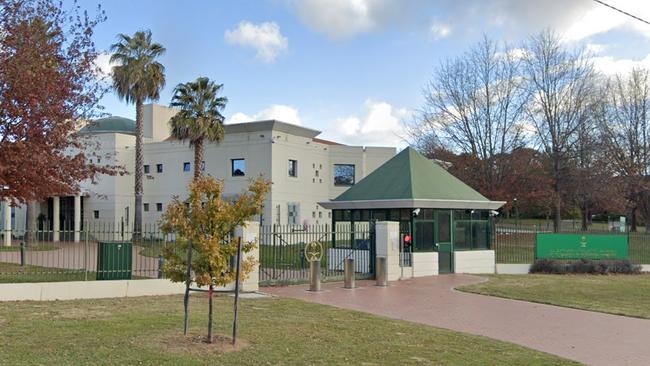Saudi embassy scandal: staff in class action over ‘$10m wage theft’
Saudi Arabia’s embassy in Canberra is facing a class action by its locally employed Australian staff who allege they have been underpaid millions of dollars in wages and super after being forced onto ‘sham contracts’.

Saudi Arabia’s embassy in Canberra is facing a class action by its locally employed Australian staff who allege they have been underpaid millions of dollars in wages and superannuation after being forced onto “sham contracts”.
More than 40 Australian citizens and permanent residents, who worked in the cultural mission attached to the embassy, claim they have been ripped off on overtime, holidays and promised wage rises, and that their superannuation and tax haven’t been paid for almost a decade.
Officials of the oil-rich kingdom have invoked diplomatic immunity and claim the Australian courts do not have jurisdiction over the embassy in its legal fight with the cultural mission staff.
An estimated $10m in wages and entitlements, at an average of $190,000 a worker, will be sought in the class action, which was filed in the Federal Court earlier this year. It involves current and former employees of the embassy’s cultural mission office.
The extraordinary legal action will likely be fought out as Albanese government laws come into effect next year criminalising wage theft by employers in Australia.
The Saudi cultural mission office was established in 2004. Its staff perform administrative duties and provide support to Saudi students on scholarships at Australian universities. They are not considered diplomatic or consular officers.
The class action alleges that the cultural mission office forced its then 100-plus workforce off employee contracts and onto “sham” independent contractor agreements in 2014.
Many of the staff originate from the Middle East, and according to several who have spoken to The Weekend Australian, they had a limited understanding of workplace laws and were warned they would lose their jobs if they didn’t sign the Contractor’s Declaration Form. At least one staff member has claimed his signature was forged.
After the staff were put onto the new contracts, the cultural mission office stopped paying their superannuation entitlements and tax obligations. It is also alleged that their bosses abandoned annual pay-rise assessments and stopped paying penalty rates for working on weekends, public holidays and for overtime.
Despite the staff members being deemed contractors, the class action claims they were still treated as employees in that they were directed in their duties in the same way, did not negotiate fees and were not requested to provide an Australian Business Number or invoices for their work as would be required for a contractor. A staff member, who would not be identified for fear of retribution, said the staff were told the agreements were lawful by their bosses in the embassy.
“Everyone was just too scared to stand up to them because we would lose our job,” the staff member said. “They threatened us with the sack if you didn’t sign.
“They didn’t give us a chance to seek legal advice and told us they would freeze our monthly pay until it was signed. Most of us don’t have a copy of the agreements. We have been fighting internally to have it fixed, we have appealed to the diplomats in the embassy, it has been raised again and again. Some people lost their jobs when they complained.”
A staff member said he set aside money to pay tax over the years but others weren’t aware of their obligations. He said the Australian Taxation Office was aware of the issues with the cultural mission office staff.
A spokesman for the ATO said it could not comment on individual cases.
The class action was filed in the Federal Court in May against the Royal Embassy of Saudi Arabia in Australia (Cultural Office). It follows a related case involving 17 workers of the cultural mission office that has quietly been making its way through the courts.
Last year, those workers secured a victory when the Federal Circuit and Family Court rejected the Saudi attempts to claim diplomatic immunity. In that case, the court refused an application to have the legal action “summarily dismissed” on the grounds the Saudi cultural mission was “immune from the jurisdiction” of Australian courts.
According to the decision of judge Warwick Neville, the case – which alleged breaches under the Fair Work Act – had barely progressed past its initial 2021 application because “ … the respondents contend that they have never acceded to the jurisdiction of the court in relation to the application”. “The respondents further contend that they have diplomatic immunity,’’ Judge Neville wrote in his ruling.
The judge said the Saudis had filed a “plenitude of submissions, some of them (I have to say) a tad on the exotic side”. In his ruling, he said the Saudis had also failed to cite any legal precedent to have the case dismissed and that their submissions for general immunity were “crafted in astonishingly wide and inappropriate terms”.
“It often seemed the case that the respondents considered that the more submissions provided to the court, the greater the likelihood that the general immunity sought would be granted; as if by overwhelming force, that immunity would be recognised and formalised,’’ Judge Neville said.
The Department of Foreign Affairs and Trade was also accused of breaching the Vienna Convention of Diplomatic Relations by serving legal papers on Saudi diplomats on behalf of lawyers for the staff. It is usual protocol for legal action to be served on an embassy by the host country’s foreign affairs officials, on behalf of lawyers.
The court was told that DFAT served the legal papers to the embassy’s then deputy head of mission Ahmad al-Dagreer, who the Saudis later claimed did not have the authority to accept the documents. Judge Neville rejected that argument and the application to grant immunity and dismiss the case.
An appeal to that ruling was heard this week in the Federal Court in Sydney and a decision was reserved. It is now expected that claimants in that case will join the class action.
The solicitor for the claimants in both cases, Emily Shoemark, of Canberra-based law firm Snedden Hall & Gallop Lawyers, issued a statement confirming the extent of the legal action.
“Snedden Hall & Gallop acts for a group of over 40 current and former employees of the Cultural Mission of the embassy of the Kingdom of Saudi Arabia, who are either citizens or permanent residents of Australia,’’ she said. “Our clients allege that they have been denied access to basic employment entitlements including superannuation, overtime and penalty rates and contractual entitlements to annual wage increases and additional annual leave for over 10 years.
“It is also alleged that their employer has forced their workers onto sham contractor agreements to seek to avoid paying these minimum entitlements.
“Our clients simply want to be provided with the minimum entitlements all Australian employees are entitled to receive.”
The Weekend Australian tried to seek comment from the Saudi Arabia embassy and cultural mission. The embassy issued the newspaper with an email address for its media contact but did not respond to a detailed request for comment.
The class action suit will now go to federal Attorney-General Mark Dreyfus, who in line with usual protocols, will send it to DFAT to serve it on representatives of the Saudi cultural mission or embassy.



